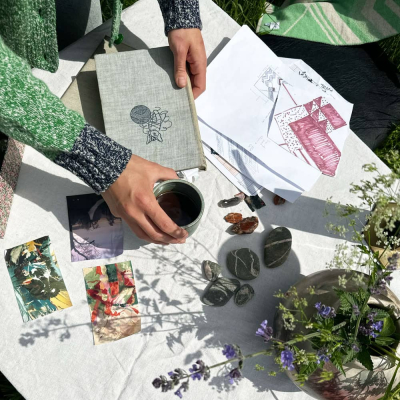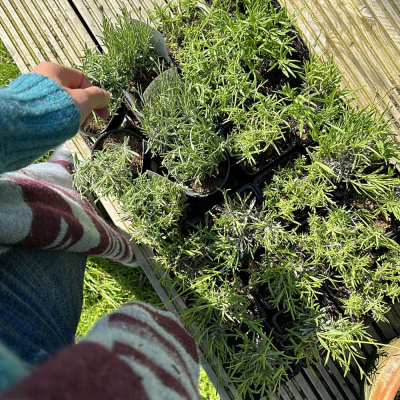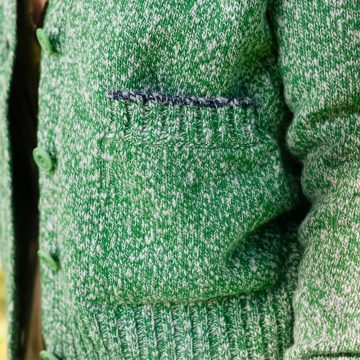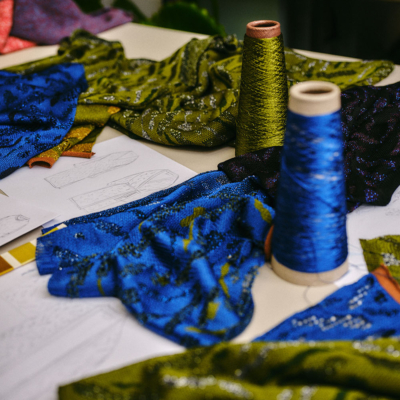GS Journal
Pledging 1% to Rewilding Britain
A love of and inspiration from nature is one of our core brand values, therefore supporting biodiversity in the UK is a natural choice.
At Genevieve Sweeney, we care deeply about the environment. We are passionate about ensuring environmental responsibility across every stage of our manufacturing process, and believe in a slower paced side of the fashion industry where we encourage my customers to make more considered choices.
When reviewing the UN’s Sustainable Development Goals, there were eight which really resonated with the Genevieve Sweeney brand and our employee values : no poverty, zero hunger, good health & wellbeing, quality education, climate action, life on land, decent work & economic growth, and sustainable cities & communities. For a while, we have wanted to do more for the environment and to support a cause that we, as a brand, believe in. We have therefore pledged to donate 1% of profits going forward to Rewilding Britain, via Work for Good., as we felt that this cause combined the eight goals that we wanted to focus on.
A love of and inspiration from nature is one of our core brand values, therefore supporting biodiversity in the UK is a natural choice. Rewilding Britain wants to reconnect the population with the natural world, restoring and connecting areas of rich natural habitat across at least 30% of Britain’s land and seas by 2030. They work by supporting a growing movement of rewilding practitioners and challenging decision makers and land owners. You can read their manifesto in full here.
Rewilding areas of the UK not only provides habitat for wildlife, but works as a carbon trap, supports local economies and helps to improve our health and wellbeing. A 2021 study from Natural England shows that a hectare of woodland absorbs as much carbon dioxide each year as 13 flights between London and Rome. The report also found that peatlands and natural woodlands are the habitats which have the greatest capacity to store carbon, while salt marshes and seagrass meadows also have a “significant role to play” in helping the UK reach net zero by 2050.
The benefits of rewilding include:
Helping to fix the climate crisis: Trees, peatlands, saltmarshes, and other ecosystems are perfectly adapted to soak up carbon dioxide and store it. 12% of the UK’s greenhouse gas emissions could be captured by restoring and protecting native woodland, peatlands, heaths, and species-rich grasslands over 30% of Britain. Restored wetlands at Steart Marshes are estimated to have stored over 18,000 tonnes of carbon over a four-year period.
Supporting local economies: Rewilding land and seas can create a thriving ecosystem of employment. Over just 10 years, rewilding at sites across England and Wales led to a 65% increase in jobs and a fourteen fold increase in volunteering positions.
Rewilding reverses biodiversity loss: By allowing diverse habitats to re-establish themselves, we can give wildlife a chance to bounce back. 56% of Britain’s species are in decline and 15% are threatened with extinction. Yet in places where nature has been allowed to return, species are burgeoning. At Dundreggan, over 4,000 species are now found, including golden eagles.
Improving our health and wellbeing: Restored natural landscapes are key to our health and wellbeing, giving us a peaceful place to escape, an open-air gym to take exercise, an outdoor classroom for children to learn, and a way to connect with others. Health care professionals now ‘prescribe’ nature. The growing practice of ‘social prescribing’ refers patients to local, non-clinical services to improve physical and mental health.
Cleaning the air and water, and creating healthy soils: Healthy soils bring us nourishing food, trees help to filter the air we breathe, and unpolluted rivers give us clean water. In Britain, only 14% of rivers are in good ecological condition, but reintroducing beavers to the right places can help improve water quality. Studies have shown that beaver dams and ponds can reduce nitrogen pollution in watercourses.
Strengthening communities: Rewilding has the great potential to unite communities in a bold vision for their neighbourhood. In Scotland’s Langholm, the community crowdfunded to buy 2,100ha of grouse moor to transform it into a nature reserve. Together they’re protecting and restoring peatlands and ancient woodlands to provide a haven for wildlife as well as a place where people can connect with wild places.
Mitigating extreme weather events: Nature is a powerful tool in helping us deal with the effects of climate breakdown. Between 2015 and 2021, the UK government spent £2.6 billion on flood defences. Rewilding – by ‘re-wiggling’ rivers or introducing beavers in appropriate places – could help us manage flooding at a fraction of the cost.
As well as donating 1% of profits to Rewilding Britain, we are making our own conscious efforts to support the cause. We are turning the land outside our studio into a lavender garden which will increase CO2 emissions and improve air quality, as well as lavender requiring less water than most plants. At home and at work, we pledge to use peat-free compost. We are rewilding our own gardens to introduce more native species and to welcome wildlife; I have loved seeing such a variety of birds in the hedgerows and muntjac in my little meadow front garden. We are growing our own herbs and vegetables, encouraging our children to grow their own fruit, and shopping locally whenever possible. And we are keeping our eyes peeled for local projects that we can support.
Know that when you make a purchase from us, a portion of our profits is going towards this worthy cause.
Find out more Rewilding Britain, via Work for Good here.
Recent Posts
GS Collections
GS Sock Subscription
Subscribe and each month you'll receive a surprise pair of socks showcasing Genevieve's signature blend of premium yarns and contemporary patterns in seasonal, statement colours.















